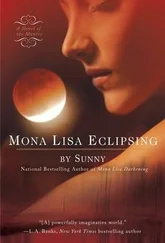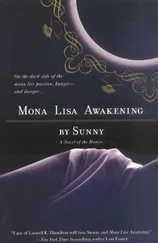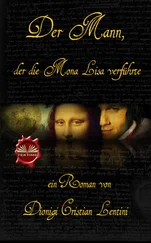Frenzied, he pulled down his black leggings with one hand and pushed his underblouse away; he wore no farsetto beneath his tunic. My struggling only fueled his ardor; at this realization, I forced myself to lie back, limp, submissive, even when he pulled my arms over my head and held my wrists with crushing force.
His manner was loveless, animalistic. He entered me so roughly that I cried out in pain.
I left myself then. I was no longer in my body, but in the light and shadows that played upon the ceiling. I was in the smell of candles burning menacingly close to my head, in the warmth emanating from the hearth.
I became a fortress; he was a beam trying to shatter me. In the end, I held. Giuliano and our child remained safe on the other side.
I came to myself with the sensation of hot liquid flowing into me, out of me. I gasped as he pulled away as quickly as he had entered. I put my hand between my legs and realized that I had been wounded.
Slowly, I righted myself and settled unsteadily onto my feet. Still breathing hard, he stood efficiently tucking his underblouse back into his leggings, adjusting his tunic, his belt. He saw me staring at him and smiled. He was cheerful, brisk, his tone playful.
“Lisa, Lisa. What a fine Jezebel you make. Go and fetch your payment.”
My face hardened; I turned it from him.
“Go,” he said, with a hint of danger. “Or shall I summon the servants now to come fetch the goblets? Better yet, shall I call for your father and tell him what you have done?”
Silent, closed, I walked slowly to the necklace and picked it up from the floor. The gem was warm from the fire. It was deeply colored, glittering evergreen.
I had never seen anything so ugly.
He walked over and clasped it around my neck. Once the transaction was accomplished, he transformed. He was gentle, solicitous.
“Here, then,” he said kindly. “Before you call for the servants”-he nodded at the shards of glass on the floor-“let me help. It is my fault that your hair and gown are in disarray.”
I let him touch me; he tucked errant locks back into my silk hairnet, smoothed my skirts. “I am so sorry your lovely camicia is torn. I shall have it replaced at once with one even finer.”
I called for the kitchen maid in a voice that shook. As she swept up the glass, Francesco joked about his own clumsiness. I said nothing.
When we were alone again, I would not walk him to the door. I did not respond when he bowed and softly wished me a good night.
I went upstairs to my room and pulled off my clothes with Zalumma’s help. The camicia I threw in a corner. I was glad it was torn; I would have thrown it out anyway. It stank of Francesco.
Zalumma had brought a basin and cloth so that I could wash myself; at the sight, I began to cry. She held me and stroked my back, the way my mother had when I was a child.
Zalumma did not let me throw away the stained camicia. Instead, she pricked her finger and squeezed drops of blood onto its lap, front and back, bright scarlet against dazzling white. She folded it carefully, wrapped it in a square of cloth, tied it, and had it delivered to Francesco’s bottega in town.
F rancesco called again two days later, ostensibly to discuss progress on the gown and to arrange a fitting. This time it was he who hinted that my father should leave us alone.
I did not protest; I had known it would happen. I had already discussed this with Zalumma, who had agreed that, for the child’s sake, I had no choice but to comply. The more often I offered myself to Francesco, the more convinced he would be that the child was indeed his.
This time he brought me earrings, of diamonds and opals that spilled down the sides of my neck like tears.
Francesco soon gave up finding pretexts for his visits and became a regular at our supper table. I collected a good deal of jewelry, though the gifts grew increasingly modest. My father knew to leave the dinner table early without being prompted. We did not speak to each other of Francesco. We suffered separately, in our own lonely spheres.
…
After two weeks, immediately following another brutal encounter with Francesco, I mentioned casually to him that I had missed my monthly course.
He snorted like a man who had a great deal of experience with such things, but he had been sated and so was not ungentle. “It’s too soon to know, Lisa. You shouldn’t worry. Nerves are no doubt the cause. You’ll see.”
I let another week pass. And then I had Cook prepare my favorite dish: quail with sage and onions. I sat beside Francesco at dinner, and when my plate arrived, I leaned over the little bird, with its crisp golden skin, and inhaled deeply.
The result was gratifying. I cupped my hand over my mouth and dashed from the table; I didn’t make it out of the room in time. There, before my father and Francesco, I leaned against the wall and retched violently.
Even in my desperate state, I could hear the screech of a chair being pushed back quickly from the table. When, gasping, I was finally able to turn my swimming head to look, I saw my father standing, fists clenched, staring across the table at my future husband. This time, he did not try to hide his fury or his hate.
A servant came to clean the mess and wash my face; my father ordered the plates removed and the chamber aired. Once we were all reseated and I felt well enough, I said, “I don’t want to be married in June. I would prefer March.”
My father’s eyes darted up and to the side; he was calculating. And then his gaze lit upon Francesco and bored through to the man’s very soul. I fancied Francesco shuddered ever so slightly.
“The fifth of March,” my father said, his tone so ominous and unyielding that neither my betrothed nor I had anything further to say about it.
For a week, my father refused to leave us alone after supper-but soon after, he apparently reached an agreement with Francesco, for I was once again at the mercy of my intended.
Now that Francesco knew I was pregnant, the gifts stopped. Now he demanded I beg for the sexual act itself, since my condition was clearly the result of my wanton craving. I called myself terrible names: whore, harlot, slut.
I feared being broken. I looked on the fifth of March with dread.
It came all too soon, on a day that was damp and cool and uncommonly warmer than the rest of that bitter winter; fat clouds floated in a gray-blue sky. I could easily have ridden a white horse over the bridge to Francesco’s palazzo, but we had anticipated a cold day and so I, my father, and Zalumma rode in a carriage, with Uncle Lauro, his wife and children all riding in a wagon behind us.
My gown was of vivid bright blue velvet, with a broad belt of the same color brocade; because of my thickening waistline, I wore the belt just below my breasts. Zalumma insisted it looked as though it were meant to be worn that way. Francesco had given me a necklace of gold and sapphire, and a headdress so expensive, its presence made me nervous; it was a net of small diamonds woven into the finest gold thread. Every time I turned my head, the sun caught the diamonds, and in the corner of my eye I saw flashes of rainbow light. It was mid-morning. I was queasy and leaned out of the window to breathe in the chill air.
We left the Via Maggio and headed east on the Borgo Sant’Iacopo, leaving behind my neighborhood of Santo Spirito. From there, we rolled over the bustling Ponte Vecchio. Men and boys saw our carriage, draped in white satin, and called out, some jesting, some congratulatory, some lewd.
I had chosen the route. It would have been more convenient for the driver to cross the Ponte Santa Trinità, but it was hard enough for me to turn my face in its direction and gaze at the waters of the Arno, and think of how Giuliano had died.
Читать дальше
Конец ознакомительного отрывка
Купить книгу












